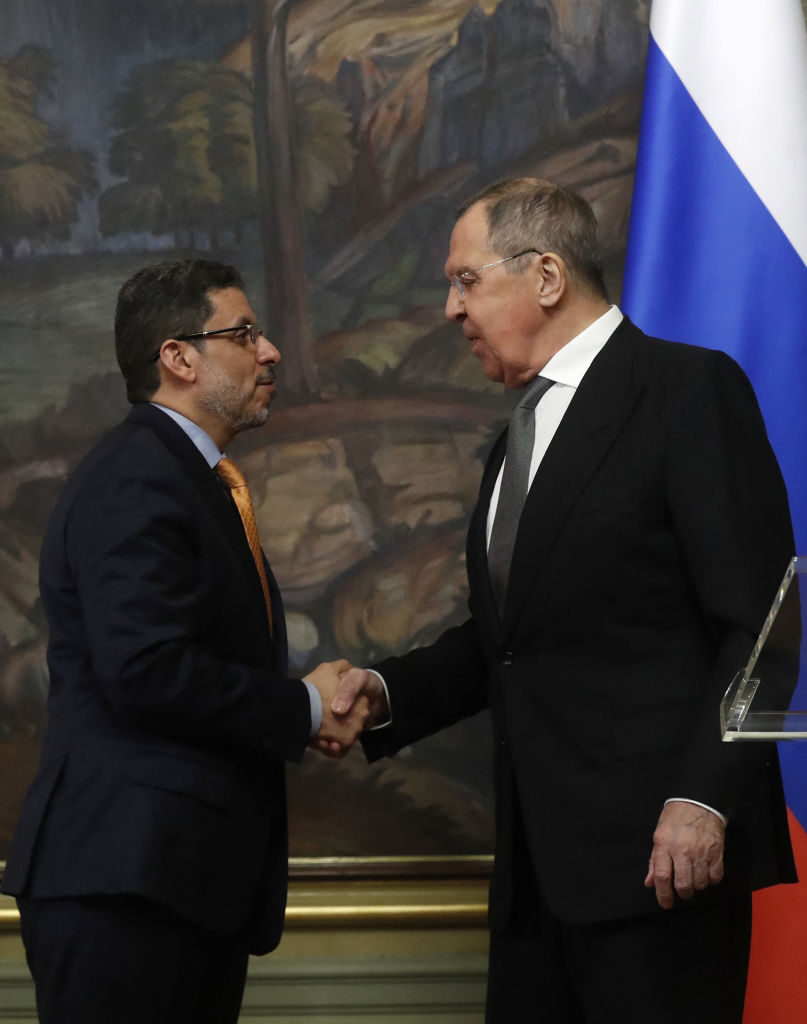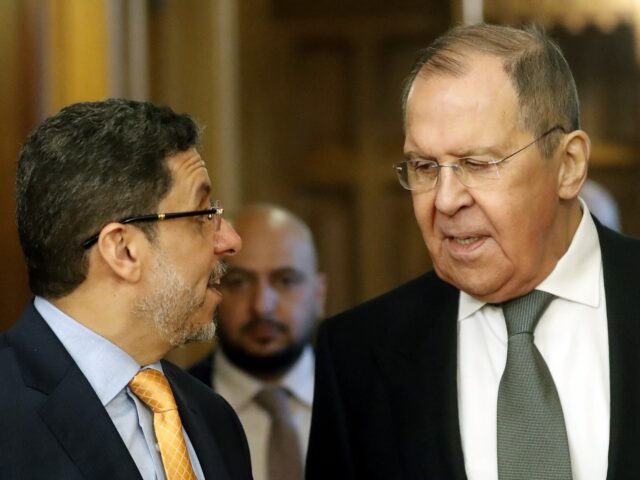The prime minister of the legitimate, but powerless, government of Yemen arrived in Moscow on Monday to meet with Russian Foreign Minister Sergey Lavrov and encourage Russia to contain the threat of Houthi terrorism in the country.
The Houthis, formally known as Ansar Allah, are a Shiite terrorist organization that staged an attack on the Yemeni government and ousted it from the capital, Sana’a, in 2014. With the backing of Iran, the Houthis have managed to survive a nearly decade-old war against the internationally recognized government and expand their global influence through an ongoing terrorist campaign against international commercial shipping in and around the Red Sea.
Houthi leaders claim that their attacks on commercial ships – which have included strikes on ships affiliated with allies such as Russia, China, and Iran – are meant in support of the Sunni terrorist organization Hamas in the aftermath of its unprecedented siege of Israel on October 7. The Houthi terrorists, who falsely claim to be the government of Yemen, declared “war” on Israel after Hamas killed an estimated 1,200 people in the country, abducted over 200 others, and engaged in infanticide, gang rape, and other atrocities against Israeli civilians.
The Houthi campaign against commercial shipping has profoundly affected the industry, forcing ships to avoid the Red Sea region and the pivotal route through the Suez Canal to Europe. The alternative, sailing around Africa’s Cape of Good Hope, is significantly slower and more expensive, sending shipping rates skyrocketing and threatening goods supplies in nations along the Mideast shipping route.

Russian Foreign Minister Sergei Lavrov and Yemeni Prime Minister and Foreign Minister Ahmed Awad bin Mubarak hold a press conference following their talks in Moscow on February 27, 2024. ( MAXIM SHIPENKOV/POOL/AFP via Getty)
Leftist American President Joe Biden responded to the attacks with two main initiatives: “Operation Prosperity Guardian,” a dubious coalition of secretive countries allegedly deploying to the Middle East to protect civilian ships, and a series of airstrikes on Houthi targets in Yemen, which have done little to deter the terrorists’ ability to attack the ships. Biden himself has admitted the latter strategy is a failure, telling reporters on January 18 about the strikes, “Well, when you say ‘working,’ are they stopping the Houthis? No. Are they going to continue? Yes.”
The few operations the Biden administration is undergoing to contain the Houthi threat appear unrelated to “Operation Prosperity Guardian.” U.S. Central Command (CENTCOM), which oversees American military operations in the Middle East, specified in the announcement of airstrikes in Yemen this weekend that they were “separate and distinct from the multinational freedom of navigation actions performed under Operation Prosperity Guardian.”
The ineffectiveness of the Biden administration has led the legitimate government of Yemen to seek alternative allies. On Tuesday, Ahmad Awad bin Mubarak, the recently appointed new head of the Yemeni government, met with Lavrov in Moscow to ask Russia for more support. Bin Mubarak chose Russia as his first destination for a formal international engagement, a gesture of respect to the Hamas-friendly regime of strongman Vladimir Putin.
Following the private meeting between Lavrov and Bin Mubarak, the Russian foreign minister condemned America and Britain for airstrikes against the Houthis, the main enemy of the Yemeni government. He did add that Moscow did not “justice shelling of commercial ships,” as the Houthis have been doing, but emphasized Russia’s discontent with attempts by America and Britain to contain the Houthi threat.
“We do not justify shelling of commercial ships, no matter how these shellings are justified. But we also cannot justify,” Lavrov said, “the aggressive actions that, under this pretext, the United States and the United Kingdom are taking against the territory of Yemen, without having any international mandate for this.”
Bin Mubarak, the Yemeni prime minister, focused his comments on lamenting that his government could not alone address the Houthi threat, according to coverage in Russian state propaganda outlet Sputnik.
“We are always open to and welcome various initiatives aimed at achieving peace. We are ready to study and work with them,” Bin Mubarak said. “But unfortunately, as before, we are faced with the fact that, due to the escalation of events in the Red Sea caused by the Houthis, we are unable to work effectively in this direction.”
U.S. Forces Strikes Houthi Targets in Red Sea Show of Defense
The Houthis attacks “undermine security and stability in the region and prevent us from working to achieve an internal Yemeni consensus,” he asserted.
The Russian news agency Tass reported that, in addition to meeting with Lavrov, Bin Mubarak will meet with members of the federal legislature and, potentially, his counterpart, Russian Prime Minister Mikhail Mishustin.”
Meanwhile, in Yemen, Russian diplomats are meeting with both the Houthis in Sana’a and the legitimate government in its southern outpost of Aden.
“[We are maintaining] communications with all parties to the Yemeni conflict: both in Aden, and in Sana’a, and abroad,” Russian Deputy Foreign Minister Mikhail Bogdanov told Tass on Tuesday. “Recently, the director of the Middle East and North Africa Department at our Foreign Ministry, Mr. [Alexander] Kinshchak finally traveled to Yemen for the first time, visited Aden, met with the leadership there right on site, as they say.”
Bogdanov did not specify when “recently” the Russian officials had visited the country.
The Houthis have invested effort in maintaining friendly ties with Russia. In January, a delegation representing the terrorists were welcomed in Moscow, where they reportedly urged Putin to oppose American and other Western interventions against the terrorists and to pressure Israel to stop its self-defense measures against Hamas, which would allow the Sunni terrorists to regroup and commit more acts of mass murder against civilians.
The Russian government had already condemned the strikes prior to the visit. In mid-January, Foreign Ministry spokeswoman Maria Zakharova claimed American airstrikes against strategic Houthi targets were an “Anglo-Saxon perversion.”

COMMENTS
Please let us know if you're having issues with commenting.